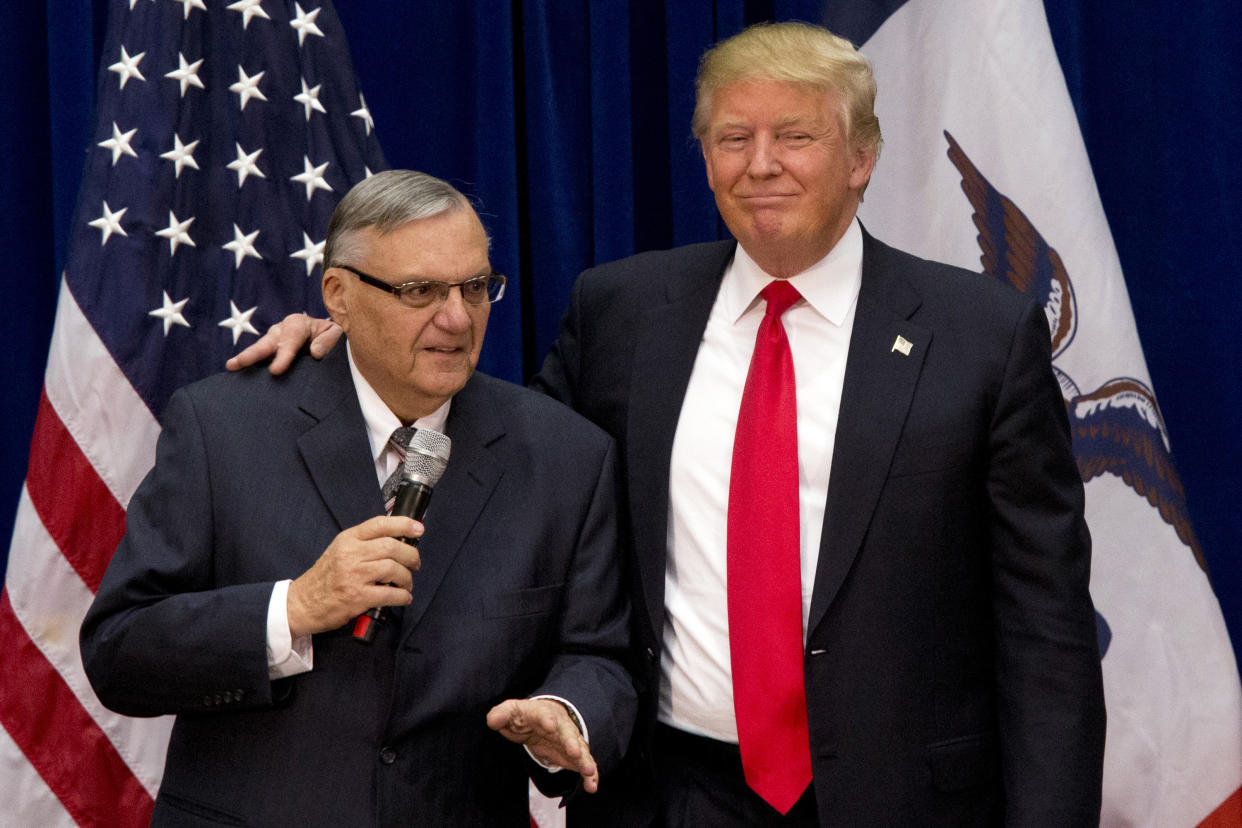A Trump pardon of Joe Arpaio would break Justice Department guidelines

WASHINGTON — President Trump could use his pardon power for the first time next week if he announces at his Phoenix campaign rally that he’ll wipe away former Maricopa County Sheriff Joe Arpaio’s criminal record.
But the pardon, if Trump decides to issue it, would be highly unorthodox and break with the Justice Department’s guidelines for clemency, according to legal experts.
“I am seriously considering a pardon for Sheriff Arpaio,” Trump told Fox News in a recent interview of the six-term sheriff who built a national profile for himself by cracking down on unauthorized immigrants. “He has done a lot in the fight against illegal immigration. He’s a great American patriot, and I hate to see what has happened to him.”
Trump could issue the pardon as early as Tuesday, Fox News reported, when he’s appearing at a campaign rally in Phoenix. Arpaio warmed up crowds for Trump on the election trail, boosting his vow to build a wall on the U.S.-Mexico border and deport unauthorized immigrants. Arpaio, 85, told NPR he’d be honored to receive the pardon.
Arpaio was recently convicted by U.S. District Judge Susan Bolton of contempt of court for ignoring a judge’s 2011 instructions in a racial profiling case. The conviction is just a misdemeanor, however, and Arpaio is not expected to serve any jail time for it.
It’s very rare for a president to pardon a misdemeanor offense. The Justice Department even has a policy against processing clemency petitions from people with misdemeanor convictions, saying it prefers to focus on felony convictions. People with felony convictions are prevented from voting in many states, while misdemeanor convictions do not trigger the same “civil disabilities,” the department says.
Additionally, Arpaio has not applied to the Justice Department for a pardon, another break in protocol. Generally, prisoners and ex-cons petition for a commutation or pardon to the Justice Department, which processes the petitions and sends its recommendations to the White House Counsel’s Office. That office sends its recommendations on to the president, who then makes the final call on who to pardon. President Barack Obama, for example, granted clemency to nearly 2,000 prisoners and ex-felons during his eight years in office and denied more than 20,000 petitions. Obama focused on shortening the sentences of those serving more than 10 years in federal prison for nonviolent drug crimes.
Still, it would not be unprecedented for a president to pardon someone who has not formally requested it through the Justice Department. And as Trump has noted himself, the Constitution gives presidents a broad and unilateral pardon power. President Ronald Reagan pardoned two high-ranking FBI officials who were appealing convictions of authorizing secret break-ins into Vietnam protesters’ homes during the 1970s while hunting for the Weathermen. Those men had also not petitioned for clemency when Reagan granted it to them.
“While Trump can do it, it would be a deep tragedy if he does, and a dark moment for the institution of clemency,” said Mark Osler, a professor at the University of St. Thomas. “There are over 11,000 petitions for clemency pending right now; he hasn’t ruled on one. Many of them are from people who have served far too much time for a crime that did far less harm than Arpaio’s.”
Last month, Trump wrote he had “complete power to pardon” whomever he wanted. He made the declaration amid an angry Saturday-morning Twitter spree after the Washington Post reported he asked his lawyers whether he had the power to pardon associates, family members and perhaps even himself in connection to special counsel Robert Mueller’s investigation into whether his campaign colluded with Russia to influence the 2016 election.
One former Justice Department official who did not wish to be named when discussing the president said it would “look really bad” if the Trump administration doesn’t start issuing clemency to regular people while doling out pardons to political associates like Arpaio. Nearly 2,000 people have applied for a presidential pardon or commutation since Trump took office, while he inherited thousands more petitions from the previous administration.
Arpaio says he is grateful for the president’s loyalty. “As far as the situation on a pardon, I didn’t ask for it but I will accept it if he does do it,” he told NPR. “This president understands what I’ve been going through. There aren’t many politicians around, believe me. I learned that real quick over this situation. You don’t see anybody next to me, and I’ve endorsed so many people.”
In 2011, a federal judge ordered Arpaio and his department to stop detaining Hispanic people to question them about their immigration status while the court decided whether the stops entailed unconstitutional racial profiling. His department continued making the stops and detaining people, but Arpaio says that’s because he didn’t understand the order. He lost his reelection bid in November.
Arpaio’s attorneys are asking for a new jury trial and have filed a petition to the U.S. Supreme Court.
Read more from Yahoo News:


